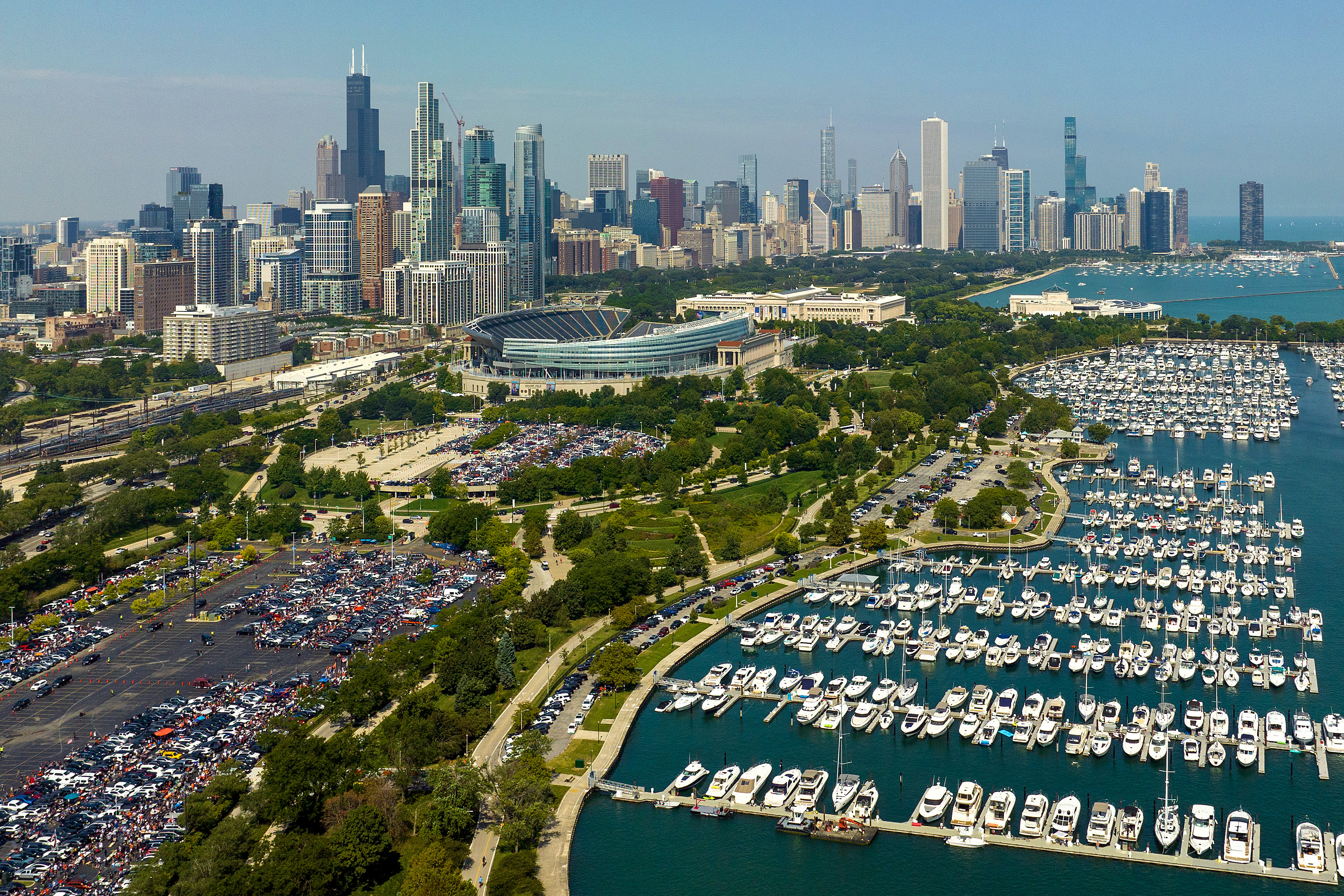The Chicago Bears turned heads Monday with their announcement that they hope to stay in Chicago, and build a new publicly owned stadium on the city’s lakefront. But that plan came with few details – and plenty of unanswered questions, particularly surrounding potential public funding for the project, as taxpayers still owe hundreds of millions of dollars on Soldier Field.
The Bears have shifted course to focus on a stadium on the city’s Museum Campus, near their current home, according to a source familiar with the plan. The team plans to invest more than $2 billion of private funding into the project, the source said and Bears President and CEO Kevin Warren confirmed.
But the project will likely cost much more than that – with a domed stadium alone likely in the neighborhood of $3 billion, not including development of the surrounding area.
The plan would increase public space in the area by 20%, an effort likely aimed at placating Friends of the Parks, an advocacy group that has previously voiced opposition to private development on the lakefront.
Feeling out of the loop? We'll catch you up on the Chicago news you need to know. Sign up for the weekly Chicago Catch-Up newsletter here.
Still, an unanswered question Monday was how much the project will cost in total – and how much the Bears will ask for in public funding.
The team’s announcement came just weeks after White Sox Chairman Jerry Reinsdorf traveled to Springfield to meet with state lawmakers to ask for $1 billion in state funding for a new stadium.
Legislators then instructed the two teams to work together to come up with a unified proposal.
Local
“There’s really no question that some of this timing had to do with Jerry Reinsdorf coming forward with plans for a new stadium for the White Sox,” sports and stadium consultant Marc Ganis said. “There’s only so much money there, so if the Bears were going to try and tap into some of that funding, they needed to get on the docket and not waste any time.”
“It’s not so much that the plan is fully formed, it’s more of a make sure that we are in the discussion because we want to build in the city of Chicago and we’re willing to put up $2 billion of private money to do so,” Ganis continued.
Some cast doubt on the appetite for public funding, given the unanswered questions.
“We are literally at the throwing spaghetti against the wall stage of all of this conversation about stadiums, two: White Sox and the Bears, individually and together,” said Civic Federation President Joe Ferguson.
“What’s the overall expense of all of this? What are we actually doing?” Ferguson asked. “How much are the taxpayers on the hook? How is it that we ultimately would be addressing the more than half billion dollars that is outstanding?”
That half a billion dollars is more than $589 million, to be exact – the amount still owed on the 2002 renovation of Soldier Field.
For that project, the Bears and the NFL kicked in a combined $200 million. The Illinois Sports Facilities Authority issued bonds for the remaining $398 million, backed by Chicago’s 2% hotel tax.
But because of the way the deal was structured – and several refinancings later – the ISFA now owes $375 million in principal and $214 million in interest on those bonds, as the Bears prepare to ask state lawmakers for another cash infusion to construct a new home.
Also backed by the hotel tax under ISFA’s jurisdiction is $50 million in debt on Guaranteed Rate.
“Sports stadiums are economic losers in general. Football in particular,” said University of Chicago economics professor Allen Sanderson. “They’re not used enough during the year to make them profitable.”
Sanderson said revenue projections for stadium projects rarely come close to meeting expectations.
“It would be, I think, almost impossible to come close to breaking even on that type of investment,” Sanderson said.
With little detail on a new stadium’s total cost – or how much taxpayer funding the Bears will request – Ferguson said public officials should exercise caution.
“That is not a place of good governance and the people of Chicago and the region don’t need too look very far to know what this sort of chaotic approach yields,” Ferguson said.
“We can look back to things like the parking meter deal and just go back further and look to what we did with Soldier Field in the early 2000s,” he continued. “All the red flags are there. we need leadership to channel all of this so that we can make a reasonable assessment as to whether this is for the overall good, and it’s for the overall good that doesn’t come at the expense of taxpayers.”
The Guaranteed Rate debt is slated to be paid off in 2029. The Soldier Field debt is scheduled to be paid off in 2032, costing more than $1 billion when all is said and done.



